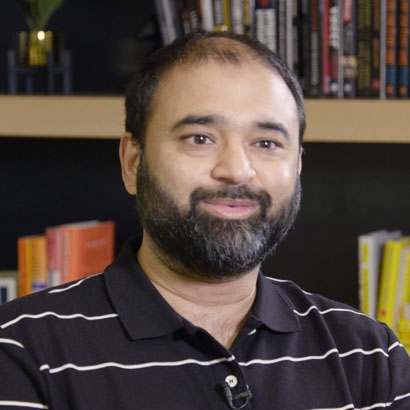At Morgan Stanley’s third annual Sustainable Investing Summit, leaders across government and business explored solutions for the world’s most urgent sustainability challenges—climate change, social inequity and healthcare access—all more interconnected than ever before.
The world’s greatest sustainability challenges are more interrelated than ever before. They lie at the intersection of climate change, economic inequality, social justice and healthcare access, and addressing them will require innovation, coordinated cross-sector efforts and abandoning business as usual thinking.
This interconnectedness—and the need for bold solutions—was the focus of the 2021 Morgan Stanley Sustainable Investing Summit, the firm’s third annual meeting of policymakers, economists, scientists, physicians, entrepreneurs and investors devoted to tackling some of the most complex and pressing issues we now face.
The Summit took place just days before global leaders, including many Summit participants, convened in Glasgow for the 26th UN Climate Change Conference of the Parties (COP26), a gathering of countries, corporations and members of civil society, which aims to galvanize support for large scale climate action.
Speakers at the Summit included former Vice President Al Gore, UN Special Envoy on Climate Action and Finance Mark Carney, former U.S. Securities and Exchange Commission (SEC) Chair Mary Schapiro, Pfizer Chief Executive Officer Dr. Albert Bourla and Tokyo Governor Yuriko Koike who, throughout the morning, discussed climate mitigation, the need for public and private organizations to embrace environmental and social responsibilities, better access to public health and the creation of more equitable socio-economic opportunities.
A common thread across speakers was their shared optimism for the future of climate action based on the commitments and resilience of younger people, a belief supported by recent findings from the Morgan Stanley Institute for Sustainable Investing, which shows sustainable investing interest among individuals has reached new heights among younger investors making the urgency for solutions an imperative.
Read on for Summit highlights, or watch the 2021 Sustainable Investing Summit discussions in full here:
Growing ESG Imperatives Among Corporates
Sustainability commitments from governments will require parallel environmental, social and governance (ESG) initiatives from the private sector, according to former SEC Chair Mary Schapiro, who spoke about the obligation for corporate board rooms to prioritize sustainability issues with Dr. Linda A. Hill, Wallace Brett Donham Professor of Business Administration at the Harvard Business School.
Boards are strategizing around topics such as climate action because investor and regulatory demands are growing.
Boards are strategizing around topics such as climate action because investor and regulatory demands are growing, Schapiro said. C-suite executives are expected to set robust targets for reducing emissions, which will require communicating how business models, strategies, governance and capital allocations will align with building a net-zero economy.
Building a more inclusive society goes hand in hand with sustainability, Hill noted, and corporates are working to address it with substantive policies. “If there's a crisis, it hits people who are more marginalized even harder,” she said. Boards are beginning to understand that serving and protecting marginalized communities requires efforts that go beyond solely boosting representation of women and people of color in senior ranks at companies. “It means looking at suppliers and the intended and unintended impact of actions, products and services,” she said.
Eloy Lindeijer, former Chief Investment Management and member of the Executive Committee of the Dutch pension service provider PGGM, underscored the importance of corporations adhering to reporting standards in order for investors to effectively mobilize capital for sustainability solutions. He cited the Global Impact Investing Network and International Financial Reporting Standards Foundation as helpful resources that have begun to streamline corporations’ sustainability disclosures. “Corporates are facing reporting fatigue,” he said. “Investors often can't see the forest for the trees. So there is a huge need for standards setting.”
Sustainability and Marginalized Communities
Echoing Hill’s remarks, climate scientist Rosina Bierbaum pointed out, “It's the poorest everywhere who are suffering the most from these impacts.” Bierbaum, the University of Maryland’s School of Public Policy Research Professor, said, “That's why you've seen the small island states be so vocal in climate negotiations. In wealthy countries, years of injustice in red lining of cities, underinvesting in infrastructure in poorer communities and energy access must be rectified as we address climate change and build back better.”
Similarly, Former Vice President and Nobel Peace Prize Recipient Al Gore focused attention on developing economies in need of funding to fight climate change. These countries are “simply not seeing the flows of private investment” for solar and wind energy, “the cheapest source of electricity by far,” he said. “We need to find a public-private formula that unlocks those markets for private investors.”
Supporting marginalized communities will require showing them that sustainability technologies can be economical as well as environmentally advantageous, said Harish Hande, co-founder of SELCO-India. “We can prove to a lot of the poor as well as the lower middle class that a rice mill or blacksmith blower that runs on solar in fact is economically viable to them, and the added bonus is the climate.” He added that young Indian farmers are employing sustainable farming, but their ideas may never reach beyond the country’s borders because of language barriers. “The Internet and policy makers are in an English-speaking world,” Hande said. “Kannada speakers, or Odia speakers or Vietnamese-speaking farmers—their models of sustainability are not getting documented as case studies that could be replicated. How do we make sharing of knowledge more inclusive?”
The Harsh Light of COVID
Of course, few recent crises underscored the Summit’s focus on the systemic nature of sustainability issues as has the COVID-19 pandemic. And it drew a particularly bright line under the inequities of healthcare access.
Dr. Albert Bourla, Chairman and CEO of Pfizer, drew attention to inadequate infrastructure in poorer countries to vaccinate populations en masse: “Soon there will be enough doses for the poor countries, but the medical infrastructure in these countries will not be good enough—there are very few places to do massive vaccination campaigns.”
Dr. Steve Corwin, President and CEO of NewYork-Presbyterian suggested greater public and private investments in worldwide healthcare infrastructure to help address the problem of unequal vaccine access. “This pandemic revealed terrific inequities within our own country between rich and poor,” he said. “You have to work assiduously at reducing disparity in outcomes, whether it's COVID or anything else.”
We're talking about all capital allocation decisions taking into account not just credit risk but the transition towards net-zero and whether a certain transaction advances or retards it.
The Role of Finance in Reaching Net-Zero Emissions by 2050
Financial institutions should play a key role in helping limit global warming to 1.5 degrees Celsius above pre-industrial levels, a goal set in the Paris Agreement, said Mark Carney, Former Governor of the Bank of England and UN Special Envoy on Climate Action and Finance. He recommended that banks, insurers, asset managers and asset owners assess portfolio risks through climate stress tests that would measure their resilience to the physical impacts of climate change and policies that facilitate a low-carbon economy.
“We're talking about all capital allocation decisions taking into account not just credit risk but the transition towards net-zero and whether a certain transaction advances or retards it,” Carney said. That will include projecting what assets may depreciate: “A fossil fuel reserve, some part of the energy infrastructure complex, components in the internal combustion engine automobile supply chain,” were examples of assets that may become financially unviable in the future. To help preserve the stability of markets, financial institutions should help support industries with high carbon footprints reduce their emissions, Carney said.
Yuriko Koike, Governor of Tokyo, also underscored the importance of finance in helping cities achieve net-zero emissions. Tokyo aims to reduce emissions by 50% from 2000 levels by 2030 and phase out sales of new gasoline-only passenger cars in the same time period, she said, and doing so requires that governments help incentivize companies to take action, such as issuing green bonds. “We are examining various measures, such as tax schemes and increasing subsidies in cooperation with the national government,” Koike says. “Our efforts to make Tokyo a global financial center aim to spur Tokyo's sustainable development.”



